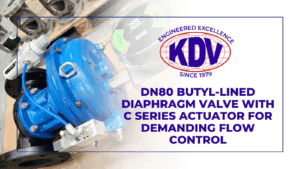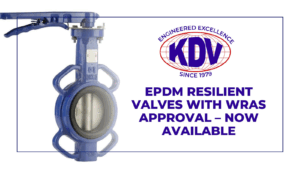The Advantage of using a Diaphragm Valve and its Disadvantage
A diaphragm valve is a reliable solution for controlling the flow of fluids in corrosive and abrasive applications. This type of valve has a number of advantages, including its ability to handle high pressures and temperatures, as well as its resistance to corrosion and abrasion. However, there are also some disadvantages to using diaphragm valves, such as their relatively limited size range.KDV Flow Uk makes a lists of the advantages and disadvantages of diaphragm valves.
Advantages of using a diaphragm valve
- Structure is simple, that being said it can be disassembled in case there’s a need for replacement of the diaphragm or other parts. Since there’s no contact between the fluid and moving parts, it can be used for fluids that are corrosive in nature. It can also be used with abrasive fluids as well since there’s no direct contact, this means that wear and tear is greatly reduced.
- Excellent performance with a low-pressure drop, which is an important factor when looking at valves for critical applications.
- With the chemical resistance of a diaphragm valve, it is possible to handle hazardous chemicals and radioactive fluids with ease.
Beyond chemical resistance, diaphragm valves are inherently self-draining, reducing the risk of fluid retention and contamination, which is particularly valuable in sanitary or clean-in-place (CIP) systems. Their flexibility in material options for the diaphragm (e.g., PTFE, EPDM, or Viton) further enhances their adaptability across a wide range of temperatures, pressures, and chemical compositions, providing engineers with versatile solutions tailored to specific operational needs.
Disadvantages of using a diaphragm valve
- Working temperatures and pressures are limited by the diaphragm material. Generally, the pressures are limited to 200 psi (1380 kPa) and temperatures up to 400 F (204 C).
These thresholds may be insufficient for high-pressure or extreme-temperature applications, such as those encountered in heavy industrial or petrochemical processes. To mitigate this, selecting advanced diaphragm materials like PTFE or specialized elastomers can help extend these limits, though such options may come with higher costs.
- Size range is limited when compared to other valves, usually NPS ¹⁄₂ to 12 (DN 15 to 300). For systems requiring very large valves, alternative options such as gate or butterfly valves may be more suitable.
- Not recommended for vacuum services. If not properly maintained, diaphragm valves can become blocked with debris over time which will affect its performance
potentially causing system inefficiencies. Regular cleaning and preventative maintenance, including inspection and diaphragm replacement, are crucial to avoid such issues. While diaphragm valves offer reliability and durability for many applications, their performance is highly dependent on proper installation, material selection, and upkeep.
While diaphragm valves are a reliable solution for many applications, it’s important to keep in mind their advantages and disadvantages before making a decision. When used in the right application, diaphragm valves can provide excellent performance and durability. However, they may not be the best choice for every application due to their limited size range and working temperatures.
What are some advantages and disadvantages of diaphragm valves that you’ve experienced?
Frequently Asked Questions (FAQ): Diaphragm Valves
1.What are the key factors to consider when selecting a diaphragm valve?
Key factors include the operating pressure and temperature limits, fluid compatibility, valve size, flow characteristics (e.g., flow coefficient or Cv), and application-specific requirements like sanitary standards or vacuum capability.
2.Can diaphragm valves handle high-pressure or high-temperature applications?
Standard diaphragm valves typically handle up to 200 psi (1380 kPa) and 400°F (204°C). If your application exceeds these limits, ask about advanced diaphragm materials or consider other valve types.
3.Are diaphragm valves compatible with automated systems?
Yes, diaphragm valves can be equipped with pneumatic or electric actuators for automated operation. Confirm compatibility with your existing control systems before purchasing.
4.What certifications or standards should I look for in a diaphragm valve?
Ensure the valve meets industry standards such as ASME, ISO, or API certifications. For sanitary or pharmaceutical applications, check for FDA or USP Class VI compliance.
5.How do I evaluate the long-term cost of ownership?
Consider the total cost of ownership, including the initial valve cost, maintenance expenses, diaphragm replacement frequency, and operational efficiency. Higher upfront costs for advanced materials may save money in long-term reliability and performance.
6.Can the valve accommodate potential system expansion?
Diaphragm valves generally come in sizes ranging from NPS ½ to 12 (DN 15 to 300). If your system is expected to expand or require larger valve sizes, alternative options like butterfly or gate valves may be more appropriate for accommodating higher flow rates or larger pipeline diameters. Additionally, modular designs in diaphragm valves may provide some flexibility for changes in operating conditions without replacing the entire valve.
7.Can the valve handle multiphase fluids or slurries effectively?
Diaphragm valves can handle multiphase fluids and slurries effectively, especially in applications where abrasive particles are present. The isolation of the diaphragm from the moving parts minimizes wear and tear caused by abrasive media. However, care must be taken to avoid blockages, and routine maintenance is recommended to remove any sediment buildup in the flow path.
8.How does it handle low-pressure drops in critical applications?
Diaphragm valves are known for their minimal pressure drop due to their streamlined flow path and lack of obstructions in the open position. This makes them an excellent choice for critical applications where maintaining flow efficiency is crucial. The flow coefficient (Cv) should be evaluated to ensure it meets the application’s performance requirements.
9.Is the valve self-draining, and does it meet sanitary standards such as FDA or USP Class VI compliance for food, beverage, or pharmaceutical applications?
Yes, many diaphragm valves are designed to be self-draining, reducing the risk of fluid retention and contamination. For industries such as food, beverage, and pharmaceuticals, valves are available that meet strict sanitary standards, including FDA approval and USP Class VI compliance. These valves are often used in clean-in-place (CIP) systems for ease of cleaning and maintaining sterility.
10.How easy is it to disassemble and replace the diaphragm or other components?
Diaphragm valves are designed with simplicity and modularity in mind, making them easy to disassemble for maintenance. Diaphragm replacement or part servicing typically involves minimal tools and can be performed without disrupting the rest of the system, reducing downtime.
If you have any questions about whether a diaphragm valve is right for your application, please contact us. Our team in the UK would be happy to help you find the perfect valve for your application.


